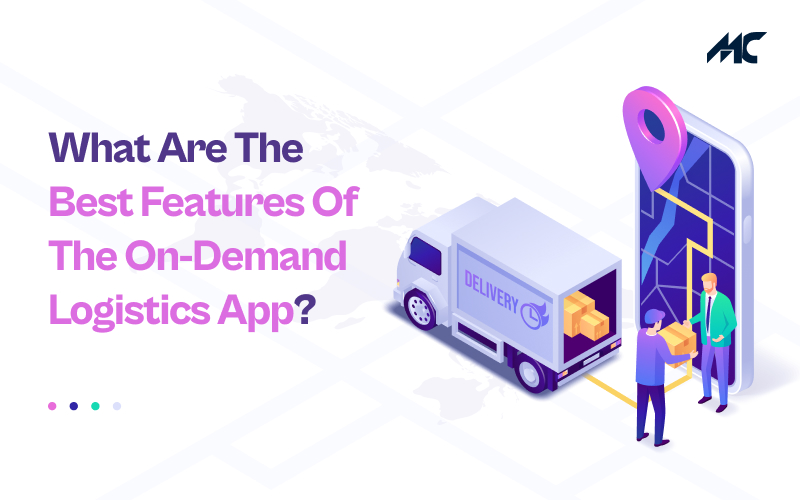
Being the foundation of trade, the logistics sector is vital to boosting a nation’s economy. Precision and promptness are the key elements that influence a logistics company’s success. As a result, it has been noted that top logistics companies use intelligent and connecting with On demand app development company for mobile app solutions to do away with human mistakes and uphold the required standards.
Apps for mobile logistics are effective solutions that increase productivity and simplify processes. They aid in replacing outdated, inefficient, and time-consuming traditional approaches. These are the main functions of logistics mobile apps:
- Efficient fleet management via tracking of routes
- Supervision of a vehicle’s location via GPS
- cargo tracking with the use of intelligent technology like RFID, NFC, etc.
- Booking of clients’ parcels or cargo
- Managing stocks and warehouses
In light of these unquestionable benefits, you ought to consider developing a reliable logistics app from Best Logistics App Development Company. However, you must be aware of the key components of such an app before you hire mobile app developers to design an appealing logistics application for your company.
The essential elements of a capable logistics mobile app are listed in this article. Let’s get going.
The On-Demand Logistics App Module’s Exact Features
GPS-Enabled Tracking Of Vehicles And Their Drivers
Real-time GPS tracking alerts the owner or managers to the driver’s every move and the whereabouts of the car. As a result, managers may easily monitor whether a particular vehicle is operating in accordance with the planned timetable or whether the driver is on time or running behind schedule. On this basis, the managers can give the following assignment after determining the actual arrival time of the drivers. GPS tracking thus guarantees effective time management.
Prior Planning Of Routes
Allowing drivers to choose their own routes runs the risk of them taking longer routes, which would increase fuel expenses and delay deliveries. Therefore, the feature that determines the quickest path and then assigns a pre-planned route to a certain trip should be available in the logistic management software in the app. To give drivers precise directions, it is advisable to sync this functionality with digital maps. Drivers are forced to follow the pre-planned route because of this feature, which helps them save time and money on fuel. Additionally, using this functionality in conjunction with initial tracking will enable you to keep an eye on whether they follow through to the intended route or not.
Drivers’ Daily Log Schedule
The daily log feature for drivers keeps track of their daily log data. The distance traveled, the total number of deliveries and pickups performed during the day, the number of hours worked, the number of road trips taken by a driver, etc. are all included in this data. Both employers and drivers find value in these records.
Notifications During Emergencies Showing The Nearest Support Center
On their journeys, truckers frequently run into issues like fuel shortages and mechanical failures. Therefore, the fleet owners must come up with a plan to handle such situations. Wouldn’t it be fantastic if logistics apps had the capability to find the closest gas stations and auto repair shops that were open? This is a requirement for any logistics mobile app, after all. The drivers can use this function to get information about the closest gas stations, repair facilities, and towing services as well as their phone numbers. It also alerts drivers to fuel levels and provides gasoline shortage warning indicators ahead of time.
Offline Support
Applications for the logistics industry, especially those that deal with supply chain management, track data about drivers, routes taken, and vehicles. As a result, certain apps may have connectivity issues or total loss of connectivity in some locations. In order for the app to function regardless of location or connectivity, offline functionality must be present. Tasks like entering data, using GPS, changing the status of assignments, etc., should be possible for the drivers to complete anywhere, at any time.
Support For Multiple Languages
The driver side of the logistics mobile application benefits greatly from the capability that supports multiple languages. This is due to the fact that drivers come from a variety of backgrounds and are generally fluent in their native languages. As a result, an app that can be used in their native language will allow users to fully utilize the program, decreasing the problems encountered when traveling.
Conclusion
In this article we have discussed about the logistics app features, but there is more to know before developing an application so you must read Logistics app development guide to know things in deep. These outstanding capabilities of logistics mobile apps reduce the amount of time, labor, and money required to manage the workflow of a logistics organization. During the development of mobile apps, businesses may also integrate a few on-demand features that cater to the particular needs of their drivers and consumers in addition to these essential capabilities.
If you want to work with knowledgeable mobile app developers to create an on-demand logistics mobile app for your organization, MobileCoderz, a reputable mobile app development company, is a good place to start. For our international clientele, our team of skilled specialists has created bespoke software solutions for more than 7 years.